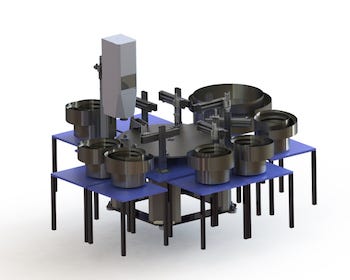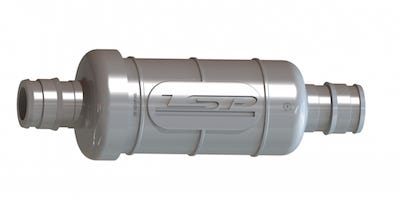Anvil design for welding systems helps automate production of novel plastic plumbing part
A supplier of polymer parts for the plumbing industry for more than 40 years, LSP Products Group Inc. (Carson City, NV) has developed a polymer-based in-line hammer arrester to replace the traditional copper device. The patented, first-of-its-kind product can be integrated into water connectors such as washing machines, icemakers and dishwashers or directly into plumbing systems piping to equalize pressure fluctuations that are associated with modern appliances.
November 18, 2015
A supplier of polymer parts for the plumbing industry for more than 40 years, LSP Products Group Inc. (Carson City, NV) has developed a polymer-based in-line hammer arrester to replace the traditional copper device. The patented, first-of-its-kind product can be integrated into water connectors such as washing machines, icemakers and dishwashers or directly into plumbing systems piping to equalize pressure fluctuations that are associated with modern appliances. Production of the parts requires the use of ultrasonic and spin welding technologies, which prompted LSP to consider replacing its manual assembly line processes and conveyor system. That led LSP to the door of Weiss North America Inc. (Willoughby, OH), a maker of rotary indexing tables and associated systems and automation products.
 Initially, LSP considered building and implementing automation internally on its own chassis. However, Weiss provided it with a 3D CAD model of a Weiss chassis along with a unique configuration proposal based on its TC (150/220) Series tables. The chassis allowed LSP to implement its own automation for two machine designs.
Initially, LSP considered building and implementing automation internally on its own chassis. However, Weiss provided it with a 3D CAD model of a Weiss chassis along with a unique configuration proposal based on its TC (150/220) Series tables. The chassis allowed LSP to implement its own automation for two machine designs.
A key design element that both machines had to address was overcoming the 400-lb downward force of the servo-driven welders. To absorb the intense, repeated loads from the welders, Weiss designed an anvil backup support that ultimately promoted longer production life for the tables and plates.
The stations, which feature a standard stationary post, center standard through hole, high-load bearings and large cam followers with needle roller bearings, are used to perform the following operations:
The TC150 six-station table is used for greasing, component insertion and ultrasonic welding operations. The chassis system includes the TC150 32-inch-diameter, ¾-inch-thick index table, tool plate, machine frame and anvil backup support for the tool plate.
LSP uses the TC220 eight-station system to produce its polymer-based push-to-connect valve for use in toilets, faucets and related products. The semi-automated system includes the 42-inch-diameter, ¾-inch-thick index table, tool plate, machine frame and anvil back-up support for the tool plate.
 The operation requires seven assembly stations and a servo spin welder station that friction-welds the two plastic parts. Weiss designed the anvil support, located under the center of the tooling head, to effectively offset the force applied to the parts and table during repeated station component spin welding. In addition, the robust rotary table platform provides accurate, level locations for pick-and-place automated assembly of the polymer-based quarter-turn valve.
The operation requires seven assembly stations and a servo spin welder station that friction-welds the two plastic parts. Weiss designed the anvil support, located under the center of the tooling head, to effectively offset the force applied to the parts and table during repeated station component spin welding. In addition, the robust rotary table platform provides accurate, level locations for pick-and-place automated assembly of the polymer-based quarter-turn valve.
Weiss completed and shipped the smaller TC150 six station unit in April 2015, and the larger TC220 eight station unit last month. Both units are nearing completion of advanced production of the polymer plumbing parts.
The Weiss TC150 and TC220 chassis systems are the heart of its in-house automation designs, says LSP, noting that it provides a cost-efficient technology to achieve its small plastic-part production goals.
LSP runs 11 injection molding machines at its site, and notes with pride that most of its wholesale plastic plumbing parts are made in the USA.
About the Author(s)
You May Also Like




